While these pairings might surprise you, we believe in the old adage that “opposites attract,” and, it’s a surefire way to hit every type you’re buying for: from theorist to practitioner, standard-bearer to trendsetter, and design nerd to—dare it be said—non-designer. You don’t have to be a creative to appreciate these reads. A curious mind will do.
First up: Michael Bierut + Jessica Helfand. The Design Observer co-founders show that while design is about craft, it begins first and foremost by questioning the world around you.
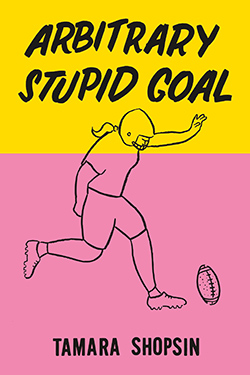 Arbitrary Stupid Goal by Tamara Shopsin
Arbitrary Stupid Goal by Tamara ShopsinThis memoir of growing up in and around her idiosyncratic family's restaurant business by writer, illustrator, and cook Tamara Shopsin is funny and beautiful. Just get it. [MB]
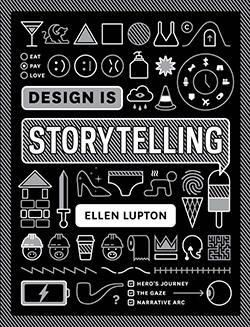 Design Is Storytelling by Ellen Lupton
Design Is Storytelling by Ellen LuptonThere is nothing that Lupton writes that doesn’t make me simultaneously rapturous (the world needs this!) and envious (why didn’t I think of this?). Her latest contribution is no exception. Pithy, provocative, and wise, Lupton has a broad and eclectic reach, with references and anecdotes sure to enlighten and educate her readers. Written in accessible, intelligent prose, with her signature witty illustrations, Design is Storytelling is an excellent addition to any design library. [JH]
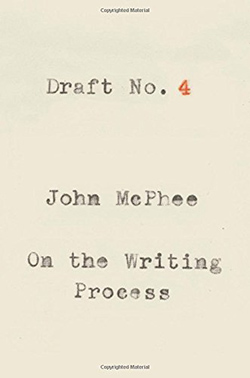 Draft No. 4 by John McPhee
Draft No. 4 by John McPheeJohn McPhee may be the best nonfiction writer in the world. He is so good he could make rocks interesting (and in fact he actually has, in his landmark book about geology Annals of the Former World). Reading Draft No. 4 is as close as most of us will get to taking his famous class at Princeton. As a designer, I was particularly intrigued by how much he relies on diagrams to establish his writing's overall structure. [MB]
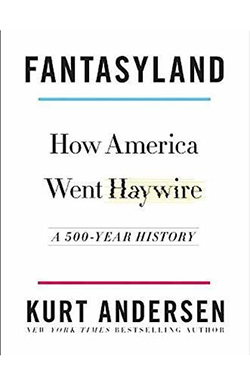 Fantasyland: How America Went Haywire by Kurt Andersen
Fantasyland: How America Went Haywire by Kurt AndersenHow can any of us hope to achieve anything without understanding what went wrong? Novelist, cultural critic, social commentator, and smartypants pundit, Andersen is a national treasure who writes with wit, insight, and epic originality. [JH]
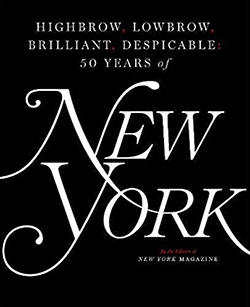 Highbrow, Lowbrow, Brilliant, Despicable: 50 Years of New York Magazine
Highbrow, Lowbrow, Brilliant, Despicable: 50 Years of New York MagazineWe tend to fetishize The New Yorker, but New York magazine has always been the publication that saw the city for what it is: big, brazen, and blustery. This oversized, beautifully-designed, 420-page book is barely big enough to contain its subject. [MB]
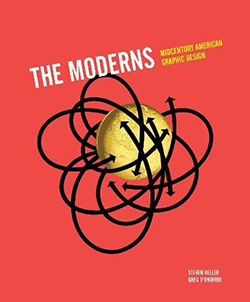 The Moderns: Midcentury American Graphic Design by Steven Heller and Greg D’Onofrio
The Moderns: Midcentury American Graphic Design by Steven Heller and Greg D’Onofrio The familiar images in this book will seem like old friends. The unfamiliar ones will startle you into a disbelief that you’ve missed them for all these years. One mystery: how can such a pitch-perfect evocation of a graphic era seem so timeless? [MB]
 Muriel Cooper by David Reinfurt and Rob Weisenberger
Muriel Cooper by David Reinfurt and Rob WeisenbergerMuriel Cooper was the first design director of MIT Press, the cofounder of the MIT’s Visual Language Workshop, and the first woman to be granted tenure at the MIT Media Lab. She designed a logo for MIT Press that has endured for half a century, designed two books (Bauhaus and Learning from Las Vegas) that rank among the best designed ever, helped introduce Helvetica-driven modernism to the USA, and was one of the first to truly understand the potential of screen-based digital graphics. If you think you know her work, you only know the half of it. If you’ve never heard of her, prepare to have your mind blown. In either regard, David Reinfurt and Rob Wiesenberger have given us a monograph that firmly — and finally — establishes her as one of the seminal figures in 20th century graphic design and communications theory. [MB]
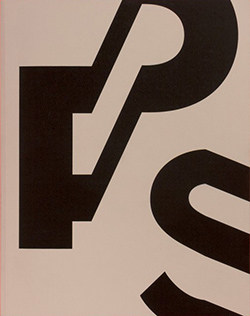 Paula Scher: Works by Paula Scher
Paula Scher: Works by Paula ScherThe ultimate monograph by and about Scher, who is arguably the world’s most famous female designer, a genius, and a designer who never ceases to reinvent herself. Her body of work is vast—in shape and scale, in content, and in spirit. It is at turns pragmatic and playful, and always smart. The book is as remarkable as its author and inspirational for us all. [JH]
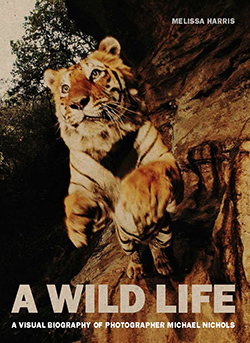 A Wild Life by Melissa Harris
A Wild Life by Melissa HarrisDoes what we see affect how we act? Can we redeem the human race by protecting our wildlife? In this magnificent book, which chronicles photographer Nick Nichols’ multi-year odyssey through Africa, Harris looks at important questions that address humanity, ethics, behavior, and stewardship. [JH]
